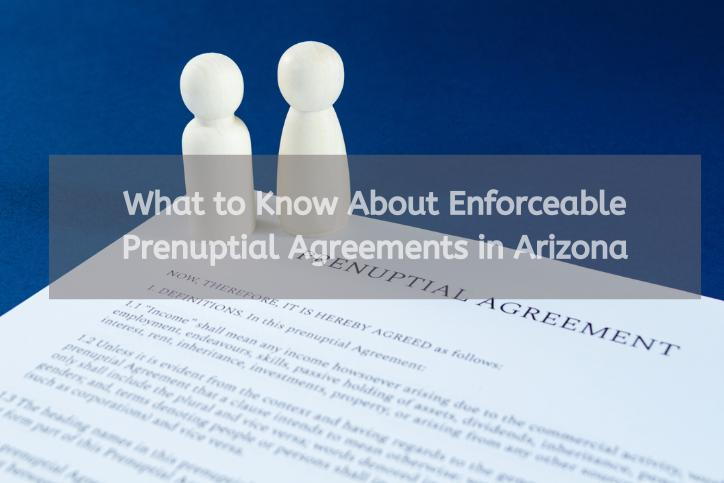
What to Know About Enforceable Prenuptial Agreements in Arizona
- posted: Mar. 18, 2024
- Child Support, Divorce, Child Custody
A prenuptial agreement is an effective way for a couple entering marriage to plan for various contingencies. Besides controlling division of property upon divorce, a prenup can define the rights of each spouse to the other’s assets and income during marriage. It is especially useful to have a prenup if you would like to protect inherited family wealth or to give certain property to children from a prior marriage or to beneficiaries other than your spouse and heirs.
An Arizona prenuptial agreement can cover these aspects of wealth protection and distribution:
Division of any property acquired by either or both of them upon divorce or death of one of the spouses
The right to buy, sell or encumber property
Terms of spousal support
Ownership of and beneficiary rights in life insurance properties
Disposition of the marital residence in the event of divorce
Division of debts and liabilities
Division of business interests
Retirement distributions
The effect of many of these provisions is to avoid the operation of Arizona’s community property law, which otherwise divides marital property equally upon divorce. By spelling out who gets what property when certain events occur, the possibility of conflict over assets is reduced.
Notably, there are certain rights and interests that cannot be controlled by a prenup. The court will not enforce any provision that attempts to restrict parenting time, legal decision-making authority or child support. The court decides what is in the best interests of the children in the event of a divorce.
In addition, a court will not enforce a prenuptial agreement that is unfair, unduly favors one party or appears to have been entered as the result of fraud, misrepresentation or duress.
Arizona’s Uniform Premarital Agreement Act controls how prenups are created and the requirements for them to be enforceable. A prenuptial agreement is valid if:
It is in writing.
It is signed voluntarily by both parties.
It is signed only after each party has fairly and reasonably disclosed their assets and liabilities. This disclosure requirement can be waived, but it must be waived in writing.
The prenup must be signed prior to the exchange of wedding vows at either a religious or civil ceremony. The agreement becomes effective only if the marriage becomes official. If two people sign a prenup but later call off the marriage, the prenup is void.
Each party planning to enter marriage should consult with a knowledgeable prenuptial agreement attorney who can draft and negotiate a fair prenup. It should be prepared well before the wedding so that both parties have time to think about its contents and to request any desired changes.
If you are considering a prenuptial agreement, the experienced attorneys at Clark & Schloss Family Law, P.C. in Scottsdale, Arizona can help with drafting, review and negotiation. For a consultation, call us at 602-789-3497 or contact us online.



